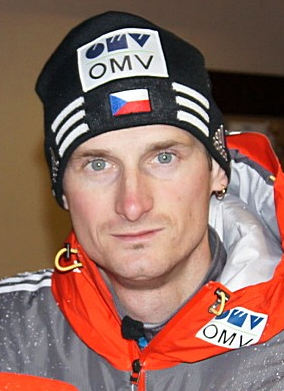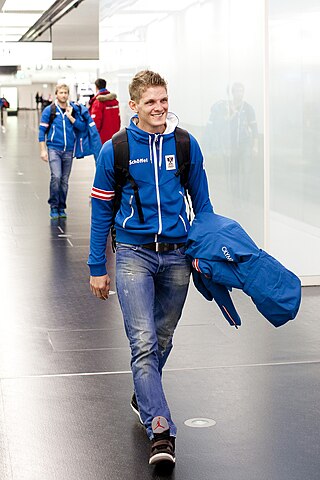
The Four Hills Tournament or the German-Austrian Ski Jumping Week is a ski jumping event composed of four World Cup events and has taken place in Germany and Austria each year since 1953. With few exceptions, it has consisted of the ski jumping events held at Oberstdorf, Garmisch-Partenkirchen, Innsbruck and Bischofshofen, in this order.

Sigurd Pettersen is a Norwegian former ski jumper. His greatest achievement is winning the 2003–04 Four Hills Tournament, with wins in Oberstdorf, Garmisch-Partenkirchen and Bischofshofen.

Jakub Janda is a Czech politician and former ski jumper. In ski jumping he competed from 1996 to 2017, winning the gold medal in the 2005–06 FIS Ski Jumping World Cup as the 2006 World Champion. He also won the 2005/06 Four Hills Tournament, as well as silver and bronze medals at the 2005 World Championships. Janda is one of the most successful ski jumpers from the Czech Republic, and is the only Czech World Cup champion to date.

Martin Schmitt is a German former ski jumper who competed from 1997 to 2014. He is one of Germany's most successful ski jumpers, having won the World Cup twice; a gold medal at the Winter Olympics; four gold medals at the World Championships; and a ski flying world record. His and his countryman Sven Hannawald's success further popularized ski jumping in Germany, and with particular help from cable TV station RTL, their coverage received great acclaim in the late 1990s and early 2000s.

Thomas Morgenstern is an Austrian former ski jumper who competed from 2002 to 2014. He is one of the most successful ski jumpers of all time, having won the World Cup overall title twice with 23 individual wins, the Four Hills Tournament and the Nordic Tournament once each, eight World Championship gold medals, and three Winter Olympic gold medals.
The 2006–07 FIS Ski Jumping World Cup was the 28th World Cup season. It began in Kuusamo, Finland on 24 November 2006 and finished in Planica, Slovenia on 25 March 2007. Adam Małysz, Poland won the individual World Cup. e.on Ruhrgas was this season's main sponsor, and therefore, this season's leader's jersey was red, in reference to the company, rather than the traditional yellow.
The 2005–06 FIS Ski Jumping World Cup was the 27th World Cup season. It began in Kuusamo, Finland on 26 November 2005 and finished in Planica, Slovenia on 19 March 2006. The individual World Cup was won by Jakub Janda, Czech Republic.

Gregor Schlierenzauer is an Austrian former ski jumper who competed from 2006 to 2021. He is one of the most successful ski jumpers of all time, having won the Ski Jumping World Cup overall title, the Four Hills Tournament, and Nordic Tournament twice each; the Ski Flying World Cup overall title three times; as well as four medals at the Winter Olympics, twelve at the Ski Jumping World Championships, and five at the Ski Flying World Championships.
The 2006–07 Four Hills Tournament was a series of ski jumping competitions held in the traditional venues of Oberstdorf, Garmisch-Partenkirchen, Innsbruck and Bischofshofen, located in Germany and Austria. The tournament was part of the 2006–07 Ski Jumping World Cup and points scored in each of the four competitions also counted towards the World Cup rankings. Before the tournament started on 28 December 2006 the World Cup leader was Simon Ammann.
The 2007–08 FIS Ski Jumping World Cup was the 29th World Cup season in history. The season began on 1 December 2007 in Kuusamo, and finished on 16 March 2008 in Planica. The season was dominated by Austrian pair Thomas Morgenstern and Gregor Schlierenzauer who between them won 16 of the 27 individual competitions.
The 2007–08 Four Hills Tournament was held in only three of the traditional venues of Oberstdorf, Garmisch-Partenkirchen and Bischofshofen, located in Germany and Austria. The competition at Innsbruck was cancelled due to adverse weather conditions and replaced by an additional visit to Bischofshofen.
The 2008–09 Four Hills Tournament was held at the four traditional venues of Oberstdorf, Garmisch-Partenkirchen, Innsbruck and Bischofshofen, located in Germany and Austria.

The 54th edition of the annual Four Hills Tournament was held in the traditional venues: Oberstorf and Garmisch-Partenkirchen in Germany, and Innsbruck and Bischofshofen in Austria. For the first and only time, the two ski jumpers at the top of the table shared exactly the same number of points after all four events. The competitors in question, Janne Ahonen and Jakub Janda, were both declared tournament winners. For Ahonen, it was the fourth tournament victory, equalizing the record of Jens Weißflog. He would surpass Weißflog and become the lone record holder two years later.

The 53rd edition of the annual Four Hills Tournament was held in the traditional venues: Oberstorf and Garmisch-Partenkirchen in Germany, and Innsbruck and Bischofshofen in Austria.

At the third edition of the annual Four Hills Tournament in Germany and Austria, Hemmo Silvennoinen became the first ski jumper to win the tournament without winning any of the single events. He won ahead of two other Finns.

The 50th edition of the annual Four Hills Tournament marked the first time an athlete won all four events of the tournament. In the past, fifteen times a ski jumper won three out of four events, but never the 'Grand Slam'. Sven Hannawald's feat would not be repeated until 2017-18 by Kamil Stoch.

The inaugural Four Hills tournament was held in January 1953. It was in planning since 1949, but in the post-war years German athletes were not allowed to compete internationally. The organizers were German and Austrian ski jumpers who knew each other from competing together for Germany under the Nazi regime

At the third edition of the annual Four Hills Tournament in Germany and Austria, Hemmo Silvennoinen became the first ski jumper to win the tournament without winning any of the single events. He won ahead of two other Finns.

The 26th annual Four Hills Tournament was won by Finnish ski jumper Kari Ylianttila. In the final ranking, he led directly ahead of five East German athletes. Another one, defending champion Jochen Danneberg, was the overall leader after his victory in Garmisch-Partenkirchen, but didn't compete at the events in Austria.
The FIS Ski Jumping World Cup in Zakopane event took place from 15 to 17 January 1999 as part of the 1998/1999 World Cup season. Competitions were held on the Wielka Krokiew ski jump, featuring two individual events on the large hill. This marked the fifth time that athletes competed for points in the overall World Cup classification in Zakopane.









